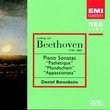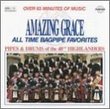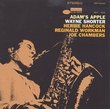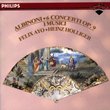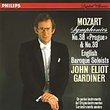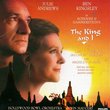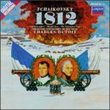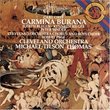| All Artists: L.V. Beethoven Title: Beethoven: The Complete Piano Sonatas Members Wishing: 0 Total Copies: 0 Label: Music & Arts Program Original Release Date: 1/1/2006 Release Date: 1/1/2006 Album Type: Box set Genre: Classical Styles: Chamber Music, Historical Periods, Classical (c.1770-1830) Number of Discs: 10 SwapaCD Credits: 10 UPC: 017685464027 |
Search - L.V. Beethoven :: Beethoven: The Complete Piano Sonatas
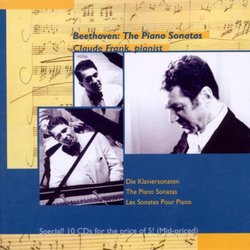 | L.V. Beethoven Beethoven: The Complete Piano Sonatas Genre: Classical
No Description Available No Track Information Available Media Type: CD Artist: BEETHOVEN,L.V. Title: COMPLETE PIANO SONATAS Street Release Date: 06/18/2002 |
Larger Image |
CD DetailsSynopsis
Product Description No Description Available No Track Information Available Media Type: CD Artist: BEETHOVEN,L.V. Title: COMPLETE PIANO SONATAS Street Release Date: 06/18/2002 Similar CDs
Similarly Requested CDs
|
CD ReviewsA great complete set to explore the 32 Alan Lekan | Boulder, CO | 01/08/2006 (5 out of 5 stars) "Beethoven's Piano Sonatas are one category in classical music brimming with an abundance of quality choices - both historic and modern - and begs the obvious question, "Which set to chose?" One can spend hours and hours comparing performers and recordings work-by-work and still not really have a solid feel for which one is "the best" - at least for you. And in doing so, the focus can become overly weighted on the finding the elusive ideal recording that one can miss the importance of just sitting down with one of the many great recordings available and revelling in the depths of Beethoven's piano music. So, if you are looking for your FIRST complete set of the 32 masterpieces, consider the complete cycles from Bernard Roberts (Nimbus) or Claude Frank here - both of which are offered at a "super budget" price below $60 brand new ($20-30 "used"). Other sets will cost $100 and up typically. Both performers give compelling, musically rich and interpretatively balanced readings. As so, such readings form a solid reference point to understand and appreciate the other historic performer's interpretive artistry (as most connoisseurs have several sets eventually). Claude Frank orginally recorded this cycle in the 60's to great fanfare. The analog tapes were remastered in 1990 and this set of 10 CD's re-released in 2002 on the "Music & Arts" label. Of course, if you are a fan of the great pianists who have recorded these works (Arrau, Brendel, Backhaus, Kovecevich, Annie Fischer, Schnabel, Goode, Gilels, Perl, Kempff, O'Conor etc) by all means get those if you like them and can afford them (although not all are complete cycles). At some point of one's Beethoven journey, it becomes enlightening to listen to such historic greats, but early on it is probably more important just to hear Beethoven-for-Beethoven and focus less on the performer. But don't let the price or lack of popularity make you think they are sub-standard performances either. Roberts is well known and much admired in his native England while German-born Claude Frank's Beethoven's recordings were, according to music writer and pianist David Dubal, "highly prized." Both get good reviews (both on Amazon and music press) and both represent Beethoven faithfully and with much artistry. ClassicsToday gave this set an most-impressive 10/10 for Artisty/Performance and a 8/10 for Sound Quality. The sound quality is good for its 60's heritage (bright, clear with little background hiss), but somewhat lacks the "breathing space," depth of tone and greater "warmth" of the latest DDD recordings. The overall ambiance has more "up-front" presence/miking than a spacious, resonant environment (such as Robert's set on Nimbus). To me Frank's piano sound is more fitting for Mozart's more delicate piano aonatas - sharp, crisp attack with a quick decay - but lacks the "weight" and power of tone for conveying the gravity of Beethoven's weightier masterpieces. But, on the good side, such sound allows one to really hear and ponder Frank's crystalline articulations (no over-pedaling or overly resonant spaces here). Also, the sound is better than some of the pre-1970's historic cycles. But definitely not audiophile quality to marvel over. As for Claude Frank's playing here: it is crisp, lyrically rich and of a high caliber. Overall, his style can be described as more "poetic" and "civilized," lacking diverting idiosyncracies. He especially shines in the early works with a touch that is fresh and vibrant - especially in the "Mozart-like" Sonatas No. 19 and 20. His sharp, articulated style clarifies the virtusotic knots found in the more hyper-kinetic sonatas like the "Waldstein." In the monumental compositions like the "Appassionata," or "Hammerklavier," Frank's expressivity is bold and dynamic yet retains clarity and control without going over the edge. In none of these does he doddle or overly ponder but keeps an energizing, brisk pace. His readings of the "name sonatas" are straight-up, clear and satisfying. In the famous dazzling presto of #14 "Moonlight," Frank displays some pristine pianism with effortlessly runnning demisemiquavers - reminding me a bit of the liquid precision and clarity of Maurizio Pollini. So, overall, Mr. Frank finds a nice balance between the Beethoven who pounded away at the sub-standard keyboards of his day and the other, surprizingly gentle Beethoven who played equisite adagios with great tenderness and poinancy. All considered, Frank finds a nice middle-ground here in this repertoire with a most respectable, very satisfying complete cycle. One other aspect that some might find appealing is his organizing each of the 10 CD's into a non-chronological "mini-recital" of contrasting periods and stylistic elements. This worked for me. The 4 pages of notes by Michael Steinberg offer an interesting overview of the 32, but are not "program notes" to follow each work. Rating: Compositions - 5 stars; Performance - 4.5 stars; Sound quality - 4 stars; Value - 5 stars. From American Record Guide: "Frank's approach to this literature echoes certain characteristics of his teacher, Artur Schnabel - spontaneity, vigor, irascibility - though I much prefer Frank's pianism, with its urbanity and higher polish. Generally his style is straightforward and common-sense, yet full of drama, has a wide dynamic range, is technically faultless, and tonally refreshing. Frank has an endearing ability to communicate the essence of a phrase or segment, or th make the structure of an entire movement lucid to the listener in a revealing, often unexpected way. These things make his Beethoven Sonatas a joy to hear; they are performances that will not pall and will tend to expose something new on each rehearing." Also on this same label is another wonderful Beethoven cycle by Claude Franks along with his daughter, Pamela Frank - The Violin Sonatas." A Creditable (and Budget-Priced) Beethoven Sonata Set J Scott Morrison | Middlebury VT, USA | 01/16/2005 (4 out of 5 stars) "Claude Frank recorded these sonatas in, if memory serves, the late 1960s and when they first came out they were greeted with much praise. Not only that, they were mid-priced even back then. They were the first complete Beethoven sonatas recorded by an American. Now they appear on CD and are budget-priced. Frank, who studied with Artur Schnabel (as well as being father of violinist Pamela Frank and husband of the late pianist Lilian Kallir) is one whose technique does not call attention to itself. What one hears in this set are closely studied performances that do not try to grab one's attention by odd dynamics, tempi or phrasing. They are, in fact, rather close in approach to that of Schnabel, but without the ancient sound and missed notes. His approach is rather gentler than some; he seems attuned to Beethoven's lyricism more than some. When the music calls for dramatic outbursts as in, say, the finale of the 'Appassionata,' he remains a bit too moderate for my taste. Still, there is something to say for a player whose playing doesn't shout. At this price this set is a real bargain, both financially and musically. I certainly wouldn't want it to be my only Beethoven sonata set, but I'm glad I have it. I suspect that a music lover coming to these sonatas for the first time, but with limited funds, this would be a good investment. 10 CDs=10hrs, 23 mins. Scott Morrison" Wonderful set at a budget price blue-59 | Blount Springs, Alabama, United States | 12/21/2005 (5 out of 5 stars) "I purchased Claude Frank's Beethoven sonatas three decades ago on RCA Victrola LPs. Unforunately, RCA's discs of that era were abominably badly manufactured. The company made a big deal about how you could bend their discs into pretzels and they'd still snap back into their original shape. The problem was that their original shape wasn't anywhere near flat. In addition, the surfaces were noisy and the production was sloppy, with stitched grooves, pre-echo, overload, etc. So I returned the set to the store as defective, and RCA deservedly had to eat it.
Now, luckily, we have these fine performances on CD. Frank is thoroughly in the Schnabel tradition: deep respect for the music, but not fear of it; obvious delight in exuberant music-making; and willingness to produce pianistic effects unintended by the composer and possibly even foreign to his conception of music. That said, the Frank set is indispensable. There are several valid traditions of Beethoven performance, and Frank's is the best of its kind. Yes, better than Schnabel's great but uneven set (Schnabel's Appassionata is weak, his Opus 111 transcendental). Frank's art is more uniformly high, he consistently hits the right notes, and the recorded sound is wonderful (far better than the old LPs, which might have been equalized without modern high fidelity systems in mind). Schnabel's set is of course historically important and certainly worth purchasing. Those seeking that collection should be very careful, however, as several incarnations exist with great variation in sound and production quality. I don't believe one can own too many complete sets of the "New Testament of piano music." I own and treasure the 32 by Schnabel, Kempff, O'Conor, Brendel, Backhaus, Arrau, even Badura-Skoda (there are insights to be gained from hearing the sonatas on Beethoven's piano). And certainly Pollini, Moravec, Solomon, Bishop-Kovacevich, and many others have contributed mightily in the individual sonatas. (Is Pollini's set complete yet?) The music is timeless and greater than anyone can play it. No matter how many records you have, you'll be glad you got Frank's (and it won't set you back much, either)." |

 Track Listings (9) - Disc #1
Track Listings (9) - Disc #1
